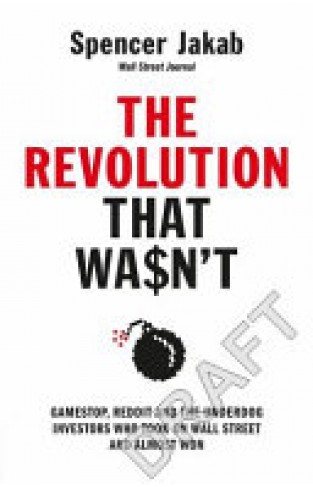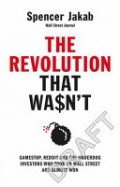- Home
- Sale
- Let's Read More FLAT 15% OFF
- The Revolution That Wasn't: How GameStop and Reddit Made Wall Street Even Richer
The Revolution That Wasn't: How GameStop and Reddit Made Wall Street Even Richer
By: Spencer Jakab
-
Rs 1,296.75
- Rs 1,995.00
- 35%
You save Rs 698.25.
Due to constant currency fluctuation, prices are subject to change with or without notice.
From Wall Street Journal columnist Spencer Jakab, the real story of the GameStop squeeze - and the surprising winners of a rigged game.
'Jakab adeptly skewers the popular but dangerously wrong narrative of Reddit's David thumping Wall Street's Goliath, and shows how the casino always wins in the end. DeepF***ingRespect for an important book with lessons far more durable than GameStop's stock market levitation.' Robin Wigglesworth, author of Trillions
During one crazy week in January 2021, a motley crew of retail traders on Reddit's r/wallstreetbets forum had seemingly done the impossible - they had brought some of the biggest, richest players on Wall Street to their knees. Their weapon was GameStop, a failing retailer whose shares briefly became the most-traded security on the planet and the subject of intense media coverage.
The Revolution That Wasn't is the riveting story of how the meme stock squeeze unfolded, and the real architects (and winners) of the GameStop rally. Drawing on his years as a stock analyst at a major bank, Jakab exposes technological and financial innovations like Robinhood as ploys to part investors from their money, within the larger story of evolving social and economic pressures. The surprising truth? What appeared to be a watershed moment - a revolution that stripped the ultra-powerful hedge funds of their market influence, placing power back in the hands of everyday investors only increased the chances of the house winning.
Online brokerages love to talk about empowerment and 'democratising finance' - while Wall Street thrives on chaos. In this nuanced analysis, Jakab shines a light on the often-misunderstood profit motives and financial
mechanisms to show how this so-called revolution is, on balance, good for Wall Street. But, Jakab argues, there really is a way for ordinary investors to beat the pros: by refusing to play their game.
From Wall Street Journal columnist Spencer Jakab, the real story of the GameStop squeeze - and the surprising winners of a rigged game.
'Jakab adeptly skewers the popular but dangerously wrong narrative of Reddit's David thumping Wall Street's Goliath, and shows how the casino always wins in the end. DeepF***ingRespect for an important book with lessons far more durable than GameStop's stock market levitation.' Robin Wigglesworth, author of Trillions
During one crazy week in January 2021, a motley crew of retail traders on Reddit's r/wallstreetbets forum had seemingly done the impossible - they had brought some of the biggest, richest players on Wall Street to their knees. Their weapon was GameStop, a failing retailer whose shares briefly became the most-traded security on the planet and the subject of intense media coverage.
The Revolution That Wasn't is the riveting story of how the meme stock squeeze unfolded, and the real architects (and winners) of the GameStop rally. Drawing on his years as a stock analyst at a major bank, Jakab exposes technological and financial innovations like Robinhood as ploys to part investors from their money, within the larger story of evolving social and economic pressures. The surprising truth? What appeared to be a watershed moment - a revolution that stripped the ultra-powerful hedge funds of their market influence, placing power back in the hands of everyday investors only increased the chances of the house winning.
Online brokerages love to talk about empowerment and 'democratising finance' - while Wall Street thrives on chaos. In this nuanced analysis, Jakab shines a light on the often-misunderstood profit motives and financial
mechanisms to show how this so-called revolution is, on balance, good for Wall Street. But, Jakab argues, there really is a way for ordinary investors to beat the pros: by refusing to play their game.
The Revolution That Wasn't: How GameStop and Reddit Made Wall Street Even Richer
By: Spencer Jakab
Rs 1,296.75 Rs 1,995.00 Ex Tax :Rs 1,296.75
Zubin Mehta: A Musical Journey (An Authorized Biography)
By: VOID - Bakhtiar K. Dadabhoy
Rs 472.50 Rs 1,050.00 Ex Tax :Rs 472.50
Myths Illusions and Peace: Finding a New Direction for America in the Middle East
By: Dennis Ross
Rs 985.50 Rs 1,095.00 Ex Tax :Rs 985.50
The Origins of Political Order From Prehuman Times to the French RevolutioN
By: Francis Fukuyama
Rs 3,505.50 Rs 3,895.00 Ex Tax :Rs 3,505.50
Manning Up: How the Rise of Women Has Turned Men into Boys
By: Kay Hymowitz
Rs 646.75 Rs 995.00 Ex Tax :Rs 646.75
The Obama Syndrome: Surrender At Home War Abroad
By: Tariq Ali
Rs 1,165.50 Rs 1,295.00 Ex Tax :Rs 1,165.50
The Quest For Meaning: Developing A Philosophy Of Pluralism
By: Tariq Ramadan
Rs 1,255.50 Rs 1,395.00 Ex Tax :Rs 1,255.50
No similar books from this author available at the moment.
No recently viewed books available at the moment.
Zubin Mehta: A Musical Journey (An Authorized Biography)
By: VOID - Bakhtiar K. Dadabhoy
Rs 472.50 Rs 1,050.00 Ex Tax :Rs 472.50
The Revolution That Wasn't: How GameStop and Reddit Made Wall Street Even Richer
By: Spencer Jakab
Rs 1,296.75 Rs 1,995.00 Ex Tax :Rs 1,296.75














-120x187.jpg?q6)







-120x187.jpg?q6)





